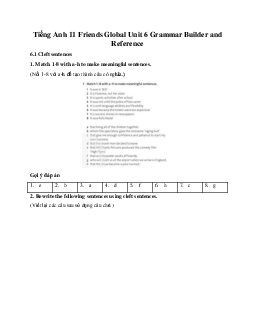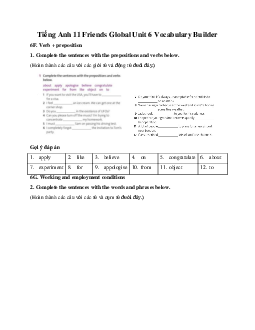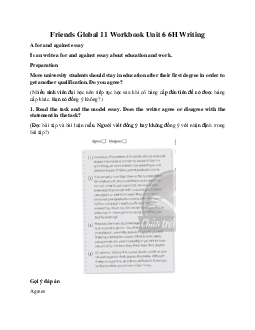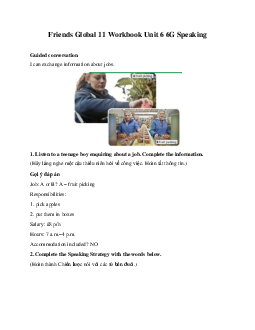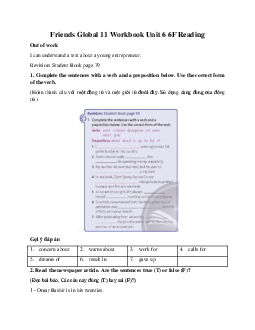



Preview text:
Tiếng Anh 11 Friends Global Unit 6 6F Reading
1. Look at the book cover. What do you think the book is about?
(Nhìn vào bìa sách. Bạn nghĩ cuốn sách nói về điều gì?) Gợi ý đáp án
It's possible that the green color on the cover represents nature or the environment, which
is a central theme of the book. I can also see a river on the left of the book. I guess this
book is about protecting the environment.
2. Read the article and answer the questions.
(Đọc bài viết và trả lời các câu hỏi.) Gợi ý đáp án
1 - What was her great interest as a young girl?
(Mối quan tâm lớn của cô ấy khi còn là một cô gái trẻ là gì?)
the natural world and writing.
Thông tin: “As a small girl, she was an avid reader and soon showed a keen interest in the natural world and writing.”
(Khi còn là một cô gái nhỏ, cô ấy là một người ham đọc sách và sớm thể hiện sự quan
tâm sâu sắc đến thế giới tự nhiên và viết lách.)
2 - What is Silent Spring about?
(Silent Spring nói về cái gì?)
Disapproved of the widespread use of pesticides and called for new policies to protect humans and the environment.
(không tán thành việc sử dụng rộng rãi thuốc trừ sâu và kêu gọi các chính sách mới để
bảo vệ con người và môi trường.)
3. Read the Reading Strategy. Match sentences A-F with gaps 1-5 in the text. There is one extra sentence.
(Đọc Chiến lược đọc. Ghép câu A-F với khoảng trống 1-5 trong văn bản. Có một câu bị thừa.) Gợi ý đáp án 1. D 2. A 3. C 4. B 5. F
4. Read the text again. Are the sentences true or false? Write T or F.
(Đọc văn bản một lần nữa. Nhưng câu sau đúng hay sai? Viết T hoặc F.) Gợi ý đáp án 1. False 2. True 3. True 4. False 5. True 6. True
5. VOCABULARY Complete the verb + preposition combinations with the words
below. Check your answers in the text and in the sentences in exercise 3.
(Hoàn thành các kết hợp động từ + giới từ với các từ bên dưới. Kiểm tra câu trả lời của
bạn trong văn bản và trong các câu trong bài tập 3.) Gợi ý đáp án 1. for 2. of 3. for 4. up 5. in 6. about 7. about 8. to
6. SPEAKING Work in pairs. Discuss these questions and report your ideas to the class.
(Làm việc theo cặp. Thảo luận những câu hỏi này và báo cáo ý tưởng của bạn trước lớp.) Gợi ý đáp án
1 - Do you think it is necessary for pesticides to be banned? Why?
(Theo bạn có cần cấm thuốc xịt cỏ không? Tại sao?)
Yes, I do. Pesticides are harmful to not only the insects they're meant to kill but also to
other animals, plants, and humans who consume them. They also have long-term effects
on the environment, which is why I think a ban on pesticides is necessary.
2 - Do you agree with the views Rachel Carson expressed in Silent Spring? Why? /Why not?
(Bạn có đồng ý với quan điểm mà Rachel Carson thể hiện trong Silent Spring không? Tại sao có / tại sao không?)
Yes, Silent Spring is still relevant today. It brought about positive changes in the
government's policies, leading to the enactment of a national ban on pesticides on
agricultural farming. It also sparked the environmental movement, resulting in the
establishment of the United States Environmental Protection Agency.
3 - Would you like to be an ecologist? Why? / Why not? If so, what would you most concern yourself about?
(Bạn có muốn trở thành một nhà sinh thái học? Tại sao có? / Tại sao không? Nếu vậy,
bạn sẽ quan tâm đến điều gì nhất?)
I would love to be an ecologist because I'm passionate about protecting the environment
and all the living organisms on this planet. I think it's essential to understand how
ecosystems work and how humans can impact them positively or negatively. If I were an
ecologist, I would focus on finding ways to reduce pollution and combat climate change.
I would also study the effects of human activities on different ecosystems, such as
deforestation and habitat destruction, and finding ways to mitigate these impacts.
